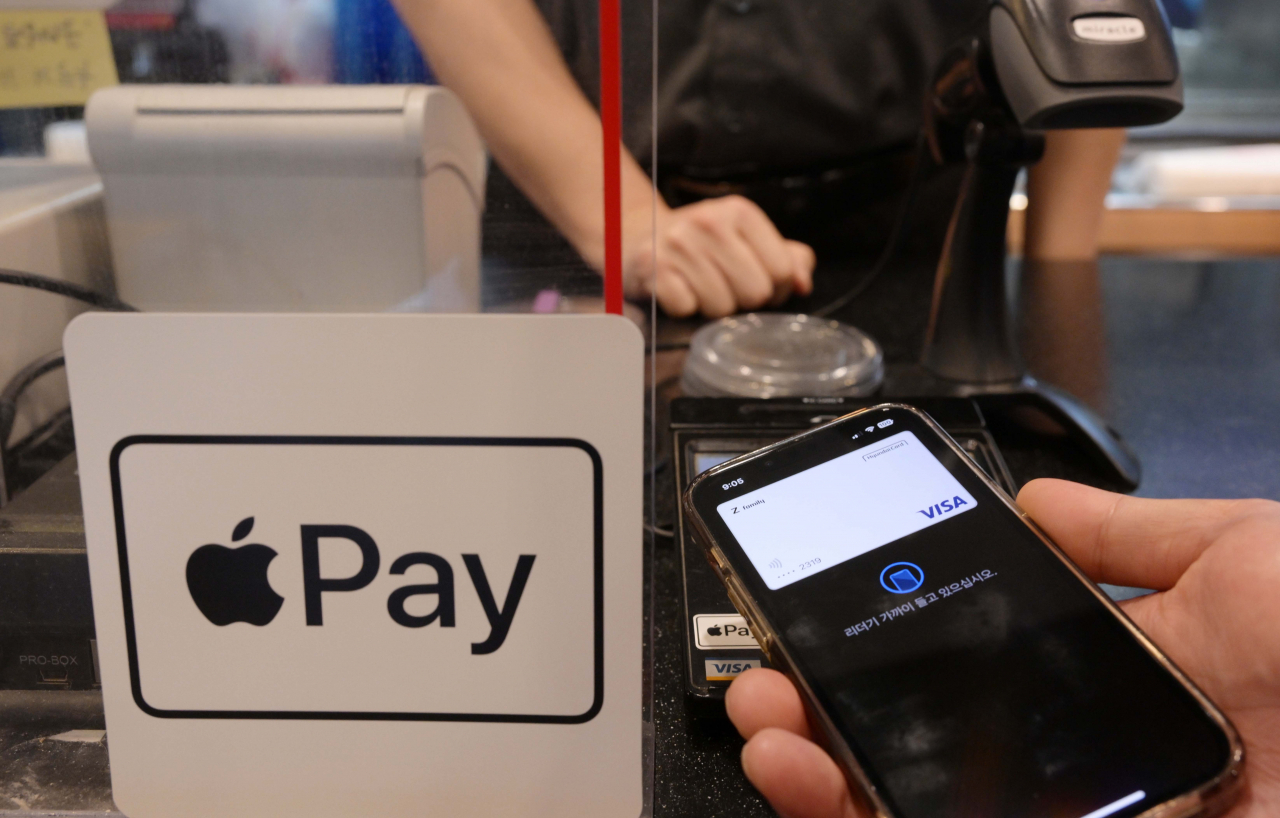 |
A customer uses Apple Pay to make a payment at a local fast food restaurant in Seoul. (Lee Sang-sub/The Korea Herald) |
Apple Pay, having launched its service in Korea in March with Hyundai Card as its initial partner, is expected to extend its reach by adding new local partners.
According to industry sources, three leading credit card issuers here -- Shinhan Card, KB Kookmin Card and BC Card -- have submitted letters of intent to collaborate with Apple Pay.
Although the companies refused to confirm the information, rumors suggest that the three firms will begin Apple Pay services sometime in September or October.
The credit card companies' decision to collaborate with Apple Pay followed Hyundai Card's announcement of attracting new members after introducing the digital wallet service in Korea in partnership with Apple.
According to Hyundai Card, the number of newly issued Hyundai Cards in the month following the launch of Apple Pay amounted to approximately 355,000, marking a significant on-year increase of 156 percent.
These newly joined members are regarded as pivotal in the local credit card market, where players are fiercely competing with each other.
According to the Credit Finance Association's data, Hyundai Card also could climb to the third position in terms of total membership as of the end of May, with 11.73 million members. This surpasses KB Kookmin Card, which previously held the third spot with 11.72 million members.
Shinhan Card remains the industry leader with 14.29 million members, followed by Samsung Card with 12.72 million.
Also, according to Hyundai Card’s most recent data, over 25.8 million transactions have been made with Apple Pay. Among these transactions, 93 percent were made at offline retailers.
While the introduction of Apple Pay has led to a notable rise in the number of newly issued Hyundai Cards, some local credit card issuers do not foresee gaining the same first-mover advantage.
Their primary objective for collaborating with Apple is to retain their current clients, aiming to discourage them from switching their primary card to one from other card issuers.
"We cannot assume that all individuals who became Hyundai Card members solely to use Apple Pay will remain loyal. If their primary card, which already provides the desired benefits, also introduces Apple Pay, there is a strong likelihood that they will revert to using only their original primary card," an industry official said on condition of anonymity.
However, some credit card issuers are still hesitant about adopting Apple Pay, due to concerns over the inadequate infrastructure required for the service, such as the limited availability of NFC readers.
“As far as we know the installation of the reader is still limited to less than 10 percent of merchants in Korea,” said another industry official who also wished to remain unnamed.
This issue has persisted even before the launch of Apple Pay.
Many commenters in Korean online forums also have been criticizing the limited use of the digital wallet service, as it was thought to be accepted mainly at convenience stores.
Out of the approximately 2.9 million stores in Korea, it was estimated that only 60,000 to 70,000 had installed NFC readers at the time of Apple Pay's launch.
Meanwhile, Apple Pay’s launch in Korea also has prompted Samsung Pay to consider changes to its fee structure, according to industry insiders.
Samsung Electronics did not confirm that it will turn to paid service, adding that nothing has been decided yet about the matter, but, in May, it decided not to renew its existing contract with local card companies for its mobile payment service Samsung Pay.
Under the previously signed contract with a local card issuer, Samsung Electronics was not entitled to receive separate commissions for Samsung Pay.
Samsung Pay is the country’s top offline mobile payment provider with a market share of 23.5 percent in the first half of last year in terms of users’ transactions. It also accounted for about 80 percent of all offline digital payment transactions.
While both Apple and its current sole local partner Hyundai Card declined to provide detailed information about fees, industry insiders estimate that Apple charges a commission fee of approximately 0.15 percent on credit transactions.
Many credit card issuers claim that this change will be very burdensome to them.
“Just because it is burdensome, it will be hard for credit card companies not to renew the contract,” an industry official said. "There are rumors circulating about potential support from Samsung. So, credit card issuers will have to closely monitor the situation."







![[Today’s K-pop] Blackpink’s Jennie, Lisa invited to Coachella as solo acts](http://res.heraldm.com/phpwas/restmb_idxmake.php?idx=644&simg=/content/image/2024/11/21/20241121050099_0.jpg)